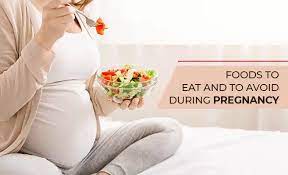The Impact of Nutrient-Rich Diets on Pregnancy

Pregnancy is a transformative and crucial period in a woman's life, demanding careful attention to health and nutrition. The impact of a nutrient-rich diet during this time is profound, influencing both the well-being of the mother and the development of the growing fetus. In this article, we explore the significance of adopting a nutrient-rich diet and its far-reaching effects on a healthy pregnancy.
Body
Essential Nutrients for Pregnancy
During pregnancy, the body's nutritional needs undergo significant changes. Key nutrients such as folic acid, iron, calcium, omega-3 fatty acids, and various vitamins play vital roles in fetal development, maternal health, and overall pregnancy outcomes.
Fetal Development and Cognitive Health
Nutrient-rich diets contribute to optimal fetal growth and development. Essential nutrients like folic acid are crucial in preventing neural tube defects, while omega-3 fatty acids support the development of the baby's brain and eyes. Adequate calcium intake ensures the formation of strong bones and teeth.
Maternal Health and Well-being

A well-balanced diet not only supports the growing fetus but also helps maintain the mother's health. Sufficient iron intake prevents anemia, a common concern during pregnancy, and supports the increased blood volume. Proper nutrition also aids in maintaining a healthy weight and reducing the risk of gestational diabetes.
Gestational Weight Management
Nutrient-rich diets play a pivotal role in managing gestational weight gain. Balancing macronutrients and incorporating a variety of fruits, vegetables, lean proteins, and whole grains can help control weight gain within recommended limits, promoting a healthier pregnancy.
Reducing the Risk of Complications
Adequate nutrition during pregnancy can help reduce the risk of complications such as preeclampsia and gestational hypertension. These conditions are often associated with deficiencies in certain nutrients, highlighting the importance of a well-rounded and nutrient-rich diet.
Energy Levels and Pregnancy Fatigue
Nutrient-rich foods provide sustained energy levels, combating the fatigue that is common during pregnancy. Including complex carbohydrates, lean proteins, and fiber in the diet helps stabilize blood sugar levels and maintain energy throughout the day.
Digestive Health
Pregnancy can sometimes lead to digestive issues such as constipation. A diet rich in fiber, found in fruits, vegetables, and whole grains, can alleviate these concerns and promote overall digestive health.
Conclusion
The impact of nutrient-rich diets on pregnancy cannot be overstated. A well-balanced and diverse array of nutrients supports both the mother's health and the optimal development of the growing fetus. As future mothers navigate this transformative journey, prioritizing nutrition becomes a fundamental aspect of ensuring a healthy pregnancy and setting the stage for the well-being of both mother and child. Always consult with healthcare professionals for personalized advice on dietary needs during pregnancy.


You must be logged in to post a comment.